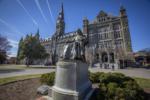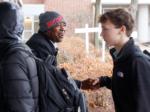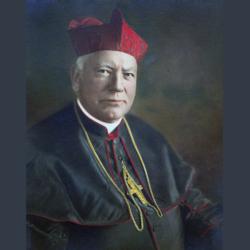Godless Harvard?
It’s hard to imagine that Harvard was originally founded as a seminary. The truth is that for a very long time there seems to have been little (if any) room for religion in the ivory tower on the Charles. To put it bluntly, the typical Harvard mind considers God generally irrelevant, that is if it considers God at all. One might find the whole idea of God academically interesting, problematic, or quaint, but the unspoken consensus is that religion is for the poor, ignorant, uneducated masses that live outside the intellectual hothouse that Harvard claims to be. Elitist-- You bet. But hostility to religion is also sadly isolated from common human experience around the world and across history. Further, such a view violates the two cardinal virtues of academia: it is neither open-minded, nor does it embrace the diversity our best universities so highly tout.
When I was a Harvard student in the early ‘80s -- a fact I’m sometimes squeamish about mentioning--I witnessed a great number of my peers struggle with their faith. Most arriving freshmen came with some basic religious formation and practice. Very few were atheists. But by the time they graduated, the overwhelming majority of students had lost their faith in God. The reason? I think it was because no one offered them a way to integrate the faith they had been given with the education they were receiving. It just didn’t seem possible to have dual citizenship, as it were, in the “faithful” and in the “company of educated men and women.”
Over the course of four years, Harvard, it appears, can accomplish what even the most misguided public schools cannot. Well beyond banning the public exercise of religion, it often feels as if the university’s institutional muscle actively intends to convince its students that even private piety has no real place in modern society. Values that are based in religious belief are considered weak and unenlightened.
I can’t say that this topic is one I spend a lot of time on. But last week, in one of the Boston daily newspapers, there were three articles about Harvard. How the topics related to one another, I thought, was interesting indeed.
The first article was an exploration of the topic five criminals among Harvard’s alumni. It seems that being listed among the “best and the brightest” does not guarantee that one will grow up to be a law-abiding citizen. The second article discussed a plan to rename the university’s Mental Health Services Department, citing that many students may not feel comfortable seeking help if doing so means admitting that they have a mental health problem. Evidently, Mental Health Services currently sees about 10 percent of the student population each semester with issues ranging from depression and sexual orientation to roommate disputes. Does that number seem as high to you as it does to me? In any case, it’s clear that not everyone living the dream in the Ivy Halls is very happy doing so.
The third story considered a faculty recommendation to require all undergraduates to study religion. Now before you get too excited, it might help to know the rationale behind the recommendation. Philosophy Professor Alison Simmons was quoted as stating, “...religion is a fact that Harvard’s graduates will confront in their lives. As academics in a university we don’t have to confront religion if we’re not religious, but in the world, they will have to.” “Confront” religion? Sounds a bit combative to me. “As academics in a university we don’t have to confront religion”? Sounds like they think such nonsense has been successfully irradicated within the walls. The pesky problem of faith, however, seems to remain a force in the world at large.
I don’t know whether Professor Simmons belongs to or practices a faith of any kind, and I’m not going to judge her in any way. But it seems to me that nobody really needs to be all that concerned about “confronting” religion. Why bother, after all, when it’s God we ought to be worried about “confronting”? In the end, none of us will face “religion.” We will face God, and He will look to us either like the One we have sought all our lives, or the One we tried so hard to lose.
Perhaps all those promising students just need an opportunity to learn what every human being needs to know: that they are loved by God; that they are created for the purpose of loving Him in return; that they will find meaning in their lives and peace in their hearts when they seek His face and embrace His Truth. There isn’t a course on earth that can teach that--not even at Harvard. Still, God is there too, searching for every soul and waiting to be found.
Jaymie Stuart Wolfe is a wife and mother of eight children, and a disciple of the spirituality of St. Francis de Sales. She is an author, speaker, musician and serves as Faith Formation Coordinator at St. Maria Goretti Parish in Lynnfield.


















